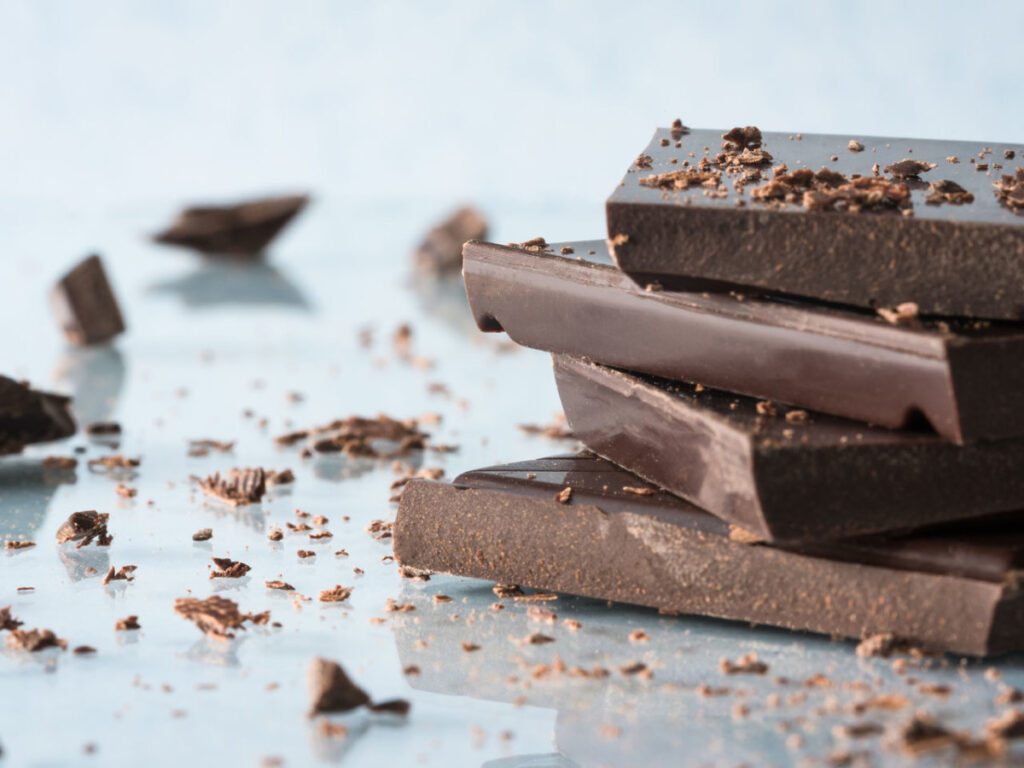Dark chocolate, often hailed as a decadent treat, is much more than just a delightful indulgence. Originating from the cacao bean, this confectionery boasts a rich history dating back centuries.

Nutritional Profile of Dark Chocolate
The distinguishing feature of dark chocolate lies in its high cocoa content. This not only contributes to its intense flavor but also packs it with essential nutrients such as iron, magnesium, and antioxidants.
Health Benefits of Dark Chocolate
Research has uncovered an array of health benefits associated with consuming dark chocolate. Its potent antioxidant properties, attributed to compounds like flavonoids, contribute to cardiovascular health and may even enhance cognitive function.
Effect on Mood and Stress Reduction
Dark chocolate has been found to stimulate the production of serotonin and endorphins, neurotransmitters responsible for feelings of happiness and well-being. This can lead to stress reduction and an overall improvement in mood.
Impact on Blood Pressure and Cholesterol Levels
Studies suggest that regular consumption of dark chocolate may help lower blood pressure and improve cholesterol levels. The flavonoids present in dark chocolate have been shown to relax blood vessels and promote better circulation.
Role in Weight Management
Contrary to popular belief, moderate consumption of dark chocolate may actually aid in weight management. Its ability to curb cravings and regulate appetite can prevent overeating and promote satiety.
Skin Health and Anti-Aging Effects
The antioxidants found in dark chocolate play a vital role in protecting the skin from oxidative stress and UV damage. Additionally, they promote collagen production, resulting in improved skin elasticity and a youthful appearance.
Potential Risks and Considerations
While dark chocolate offers numerous health benefits, it’s important to consume it in moderation. Its caffeine and theobromine content may cause adverse effects in large quantities, and excessive consumption can contribute to weight gain.
Incorporating Dark Chocolate into Diet
Incorporating dark chocolate into your diet can be a delicious and nutritious endeavor. Opt for varieties with higher cocoa content and indulge in moderation. Dark chocolate can be enjoyed on its own or used as an ingredient in various recipes, adding depth and richness to dishes.
Dark Chocolate vs. Other Varieties
Compared to milk and white chocolate, dark chocolate contains higher levels of cocoa and lower amounts of sugar. This makes it a healthier option with superior antioxidant properties and fewer empty calories.
Addressing Common Misconceptions
Despite its reputation, dark chocolate does not necessarily lead to weight gain when consumed in moderation. Additionally, while it does contain sugar, the health benefits outweigh the potential risks when consumed responsibly.
The Sustainability Factor
As consumer awareness grows, there’s a heightened focus on the ethical sourcing of cocoa beans and fair trade practices within the chocolate industry. Supporting sustainable brands ensures a positive impact on both communities and the environment.
Consumer Trends and Preferences
The demand for dark chocolate continues to rise as consumers become more health-conscious and seek out premium-quality products. This trend is reflected in the expanding market for organic and artisanal dark chocolate varieties.
Conclusion
In conclusion, dark chocolate offers a delectable pathway to improved health and well-being. With its abundance of antioxidants, mood-enhancing properties, and potential cardiovascular benefits, incorporating dark chocolate into your diet can lead to a sweeter and healthier lifestyle.
FAQs
- What percentage of cocoa is considered “dark” chocolate?
- Dark chocolate typically contains at least 70% cocoa solids, although some varieties may have higher percentages.
- Can dark chocolate be part of a weight loss diet?
- Yes, when consumed in moderation, dark chocolate can be a part of a balanced diet and may even aid in weight management due to its appetite-regulating properties.
- How much dark chocolate is it safe to consume daily?
- It’s recommended to consume dark chocolate in moderation, aiming for no more than 1-2 ounces per day to reap its health benefits without exceeding calorie or sugar intake.
- Does dark chocolate contain caffeine?
- Yes, dark chocolate does contain caffeine, although in smaller amounts compared to coffee or tea. The caffeine content varies depending on the cocoa percentage.
- Are there any contraindications for consuming dark chocolate?
- While dark chocolate is generally safe for consumption, individuals with caffeine sensitivity or certain medical conditions should exercise caution and consult with a healthcare professional.

